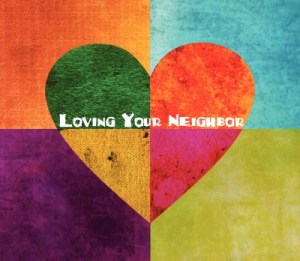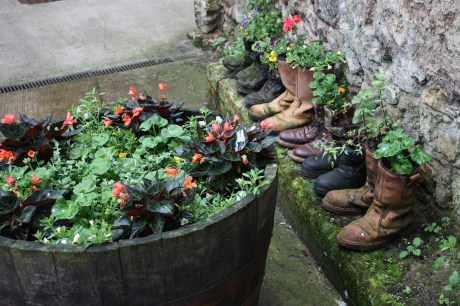Radically Sowing Seeds of Inclusiveness
July 13, 2014
Christ Church Episcopal, Norcross, GA
Proper 10 – RCL Year A
Genesis 25:19-34; Romans 8:1-11; Matthew 13:1-9, 18-23
The parable of the sower and the seeds always takes me back to the days when I was in Youth group, many, many, MANY years ago.
 When I was in the 7th or 8th grade the youth leaders decided that we would put on a production influenced by the musical Godspell. There was a group of teens that did the singing and another group, of which I was a part, that did pantomimes of narrated parables. We wore clown-style make up and bright-colored clothes and got to run up and down the aisles of the church – what else could you ask for!
When I was in the 7th or 8th grade the youth leaders decided that we would put on a production influenced by the musical Godspell. There was a group of teens that did the singing and another group, of which I was a part, that did pantomimes of narrated parables. We wore clown-style make up and bright-colored clothes and got to run up and down the aisles of the church – what else could you ask for!
The parable of the sower and the seeds was one of the big hits. As each set of seeds were tossed by the sower, children would drop in a squat on the floor in a tucked position. My favorite memory was the first set to seeds thrown. They were played by smaller children, like Charlie or Callie’s age. Then, Randy, a tall lanky teen, played the big bird that came swooping down and lifted the little person-seed way above his head and carried them down the center aisle, cawing all the way.
What made that so remarkable was that Randy was very shy. He didn’t put himself out there much and it took a while for him to understand just how BIG he needed to act in order to get the message across. But, by the time of the production, he was the biggest, boldest bird around! And in the years that followed, his confidence increased, he became one of the leaders of the Youth group, and played the role of Jesus in a different production during our high school years. It was quite a transformation… like the growing of a seed.
Experiences like that are a big part of how my faith developed when I was young. Through these shows we learned to embody the Bible stories we were hearing. They became second nature to us – ingrained in us. And although we didn’t study the text in depth, we still knew it by heart, and we had a sense, even in our early teens, of what this message of Jesus was about.
While I’m thankful for that time, it was also important that I kept moving forward in my understanding of scripture; into a more mature awareness of what this parable is meant to tell us. So, as I looked at today’s text with fresh eyes, there were a number of things that struck me.
First, it’s clear that this is a teaching moment for Jesus. A crowd has gathered. He steps into a boat, drifting just off shore, to provide a better vantage point. Then we are told that Jesus sat down – this is the posture of rabbi’s when they teach. He then directed his words to the crowd that was standing on the shore, beckoning them to LISTEN!
Something else I discovered is that this parable is the first of eight parables told in Chapter 13 of Matthew’s gospel. Six of those begin with the phrase “The kingdom of heaven is like…”, but this first one doesn’t do that. This isn’t about the kingdom heaven, but instead, it’s about spreading the word of God. More specifically, it foretells the myriad ways others will respond to Jesus’ work of spreading God’s word.
It uses the imagery of farming, which would have been familiar to the crowd. So, through the imagery of a farmer sowing seeds we find out:
- Some will hear the message Jesus shares, but will not understand it, so it is as if a bird swoops down and carries Jesus’ message away as fast as the seed fell.
- Others hear the word of God, and at first they receive it with joy, but once they face trouble or persecution because of their belief, they will abandon it.
- Still others will hear and believe, but then, over time, will become distracted by the worries of the world or the lure of worldly things, and they, too, will find following the word of God untenable and walk away.
- And lastly, there are those who will hear Jesus’ message, understand it, overcome times of struggle, and remain focused on God’s word amid worldly distractions. It is these, through patient endurance, as Luke’s version attests (Lk 8:15), that will bear fruit beyond expectation, thirty, sixty or even one hundred fold!
The part that’s left out of today’s reading is the reason why some aren’t unable to hear God’s word while others are. In the verses between the passages from today’s lectionary, Jesus points to a prophetic text from Isaiah, which says:
With them indeed is fulfilled the prophecy of Isaiah that says: “You will indeed listen, but never understand, and you will indeed look, but never perceive. For this people’s heart has grown dull, and their ears are hard of hearing, and they have shut their eyes; so that they might not look with their eyes, and listen with their ears, and understand with their heart and turn— and I would heal them. (Mt 13:14-15)
Those who cannot hear, or don’t understand are those whose hearts have grown dull, or who have stopped being willing to see or hear new things. We can each find ourselves in that place from time to time – overwhelmed by an ever-changing world – and this can cause us to shut down. To let our hearts become dull, or to allow our eyes and ears to close-off.
It’s so much easier to just keep things as they’ve always been. We’ve decided that we like things just the way they are. All these changes happening around us create anxiety – a loss of what’s familiar. So, we ask others to conform to the way we’ve always done things, instead of opening ourselves to do things in a way that meets them where they are.
Unfortunately, this is contrary to how God wants it to be. We can’t love our neighbor if we only accept them when they are just like us. And, as a church, we can’t stay relevant if we stay trapped in the past.
This isn’t new. It was just as difficult for the Jewish people who were listening to Jesus, and Jesus knew it. But it didn’t stop him from spreading the seeds of God’s word. He doesn’t throw up his hands and give up just because some people weren’t going to embrace the message – a message of love and radical inclusivity.
Jesus’ new message took the Ten Commandments, which the Jewish faith had expounded into 613 Mitzvahs, dictating precisely how to live their life as faithful Jews – and boiled these down to TWO commandments: Love God and Love Your Neighbor – and who is your neighbor? EVERYONE!
This was radical stuff, and not everyone would be able to embrace it.
But, being a disciple is about being a learner – it requires us to take the new and the old.
I mentioned earlier that there were eight parables in Chapter 13. Six begin with the phrase “the kingdom of heaven is like.” Those six, plus today’s parable account for seven, so this leaves the final parable in the chapter. It says:
“And [Jesus] said to them, ‘Therefore every scribe who has been trained for the kingdom of heaven is like the master of a household who brings out of his treasure what is new and what is old.’ When Jesus had finished these parables, he left that place.” (Mt 13:52-53)
So this last parable reveals that those who embrace the word of God, being prepared for the kingdom of heaven, do so by gaining their understanding of God from both the new – the message of Jesus – AND the old – the Jewish tradition. These aren’t mutually exclusive, but instead, the new is meant to enhance and elevate the old.
In the same way, we can’t afford to only hold fast to the ways of the past. We must embrace elements of the future.
My Mom is a great example of this. When I was in high school, I remember that my younger sister’s bicycle had a flat tire. I was planning to fix it and asked my Mom if she wanted to come out and see how I did it. Her response at the time was “No, I’m okay. I think I’ve learned enough, I don’t need to learn that.” And in the scheme of things, she was right.
But fast-forward a dozen years or so, and this same woman, who had “learned enough” was now facing computer technology – reluctantly at first. But realizing that it was the way forward, she jumped in with both feet, teaching herself how to use a PC, building databases for charities she worked with, and she became known for the personalized greeting cards she sends out to family and friends.
 Fast-forward a bit further, to about eight years ago, and she realized that she had seven grand-kids who communicated much more readily through hand-held devices than by written-letter or voice-call. So, my mom, on her flip-phone then, learned how to text. And now, from her iPhone, she sends a group text “message of the day” to her grand-kids each morning.
Fast-forward a bit further, to about eight years ago, and she realized that she had seven grand-kids who communicated much more readily through hand-held devices than by written-letter or voice-call. So, my mom, on her flip-phone then, learned how to text. And now, from her iPhone, she sends a group text “message of the day” to her grand-kids each morning.
She knew that if she wanted to be in relationship with these very important people in her life, she couldn’t just rely on them showing up for Thanksgiving dinner each year, but instead, was going to have to embrace some new things, and meet them where they are… not always, but often.
So, too, with a mature Christian faith – it must continue to grow. It must have a “bright” heart. To have eyes that are open and ears that continue to discern truth as God continues to reveal God’s self to us in new ways.
The Bible is called a LIVING text because it continues to reveal God to us in new ways. The Holy Spirit, the Triune persona of revelation, continues to impart a fresh understanding of the breadth and depth of God’s love.

Source: http://www.eaministries.co.uk/
And at the end of the day, our litmus test for if we are living into the kingdom of heaven revolves around those two most important commandments that Jesus set forth: Love God and Love your neighbor.
So, when you find yourself resisting something new, try to find that which gives life in it, that which opens doors to others, that which sows the seeds of God’s word to all people, even if they may not be open to receive it.
God is relentless in welcoming us in.
We are called to embody and impart that same radically inclusive love to others.

Photo by: Jody Greenwood
Really great sermon. Cody is a great example. You are a good sower.
Love,
Dad
I’m speechless–and this that know me, that doesn’t happen often!
I thank God for every remembrance of YOU!– I love you, your Mom